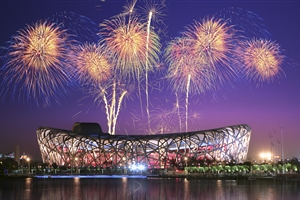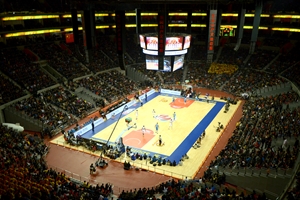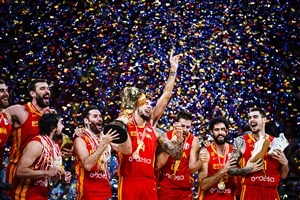
2019 FIBA Basketball World Cup bids - Philippines' experience in hosting events
MIES (2019 FIBA Basketball World Cup) - On Friday 7 August, FIBA's Central Board will decide and announce who of the People's Republic of China or the Republic of the Philippines will host the 2019 FIBA Basketball World Cup.
In the lead-up to the decision, FIBA.com takes a closer look at the proposals made by both countries, focusing on four key areas:
1. Vision and concept
2. Experience in hosting events
3. Basketball history
4. Cities and venues
Here, Samahang Basketbol ng Pilipinas (the basketball federation of the Philippines) provides information about its experience in hosting events.
The Philippines: Creating a global legacy grounded in passion, venues and experience
Much attention has been given to the passion and excitement now building around the Philippines bid to host the 2019 FIBA Basketball World Cup. As the social media capital of the world, that excitement has gone beyond national borders with an unrivalled increase in the level of support coming from fans and players across the globe.
But the Philippines Bid Committee knows that passion alone can not win the right to host a Basketball World Cup. Which is why, behind that passion, sits world-class facilities and an exceptional depth of major public event experience that is the cornerstone of the Philippines bid.
It is because of these venues, facilities and services that the Philippines Bid Committee firmly believes that we will not only meet, but exceed FIBA's expectations - delivering a Basketball World Cup that transcends the sport as a global media experience and takes basketball to new heights.
We already enjoy some of the most impressive basketball venues anywhere in Asia Pacific. Opened in July 2014, the Philippines Arena has a capacity of 55,000, a world record for any indoor basketball arena; and the Mall of Asia Arena is a celebrated five-tiered ultra-modern event venue that hosted the widely acclaimed FIBA Asia Championship in 2013.
Elsewhere, the Araneta Coliseum, shortly to undergo a full refurbishment, was home to the South-East Asian Basketball Championships (1991) and the 1978 FIBA World Basketball Cup. It remains the most cherished sports stadium in the Philippines and its renovation will extend its significance to a new generation of basketball players and fans.
And in the south of the country, the brand new SM Arena Cebu will be a state-of-the-art facility with a capacity of 22,000. Scheduled for completion in 2017, the arena is a part of an impressive hotel, exhibition and conference precinct already under construction.
The Philippines has a proven track-record on the delivery of, and planning for, major global sporting, social and political events too. In addition to the FIBA Asia Championship, which saw 140,000 fans enjoy two days of competition in Pasay City and Manila, 2013 saw the country host five major national sporting events.
In 2014, we hosted the Asian Men's Club Volleyball Championships and welcomed 21 world leaders at the World Economic Forum in Manila. Earlier this year the Philippines hosted Pope Francis' visit to the country - an event of immense logistics, attended by more than 6 million people in a single day and supported by 166,000 security personnel.
Our experience in managing such significant occasions has instilled exceptional confidence in our ability to deliver, without risk, some of the most important global events over the next 24 months. Later this year, we will host the Asia-Pacific Economic Cooperation Summit (APEC) in Manila, Cebu and the Luzon area. In 2016, we will host the International Eucharistic Congress in Cebu, with 15,000 delegates in attendance and an expected 1 million visitors attending the Opening and Closing ceremonies. In 2017, we will host the Association of South East Asian nations (ASEAN) meetings in Manila.
Such experience is important, but so too is the level of resource, investment and commitment now being made in metro and national infrastructure. The spirit of public/private partnership that sits at the heart of the Bid Committee's work extends to the development of significant assets and initiatives that will help deliver a truly exceptional experience for delegates, fans, teams and players throughout a Philippines-hosted World Cup. As a stable, fast-growing and emerging nation, investments made for the Basketball World Cup create significant benefits for residents and visitors long after the final whistle has blown.
Underpinning our ability to host an exceptional 2019 FIBA Basketball World Cup, we have appointed specialists in a number of critical areas. Our Bid Committee is made up of Government ministers, business leaders and media and marketing consultants and we have turned to specialists in areas of ticketing, technology and major public event management.
Octagon, for example, is one of the world's leading sports marketing consultancy firms and has advised Bid Committees on the management of successful major global public sports events including various Olympic games and the Rugby World Cup 2019. And Weber Shandwick, one of the world's largest communications agencies has previously advised successful bid nations on the Summer and Winter Olympics and other globally recognised major public sporting events.
Coupled with FIBA's own experience in major event delivery, we believe in the merits of an open collaborative team that, collectively, can deliver a World Cup that is memorable, sharable and utterly unique.
#PUSO2019




















